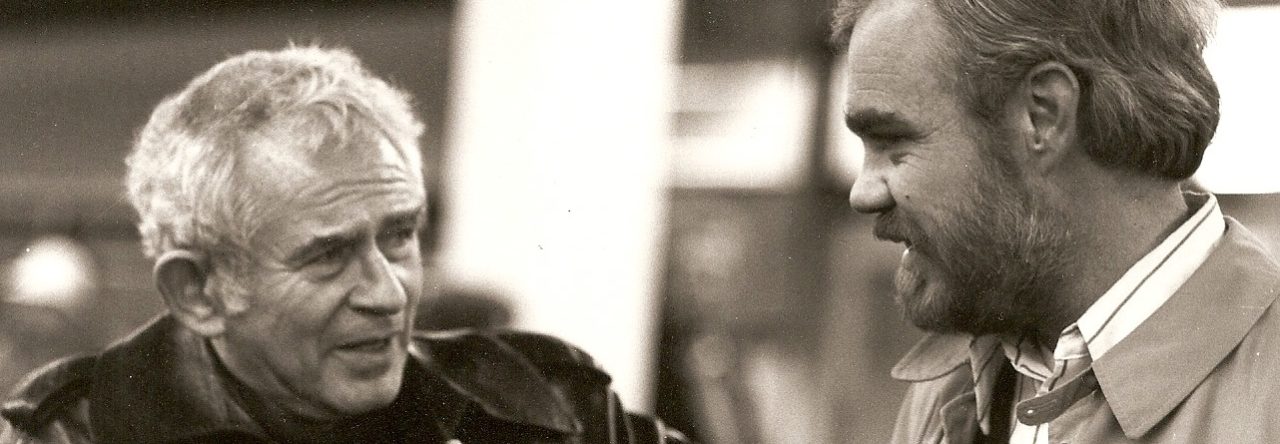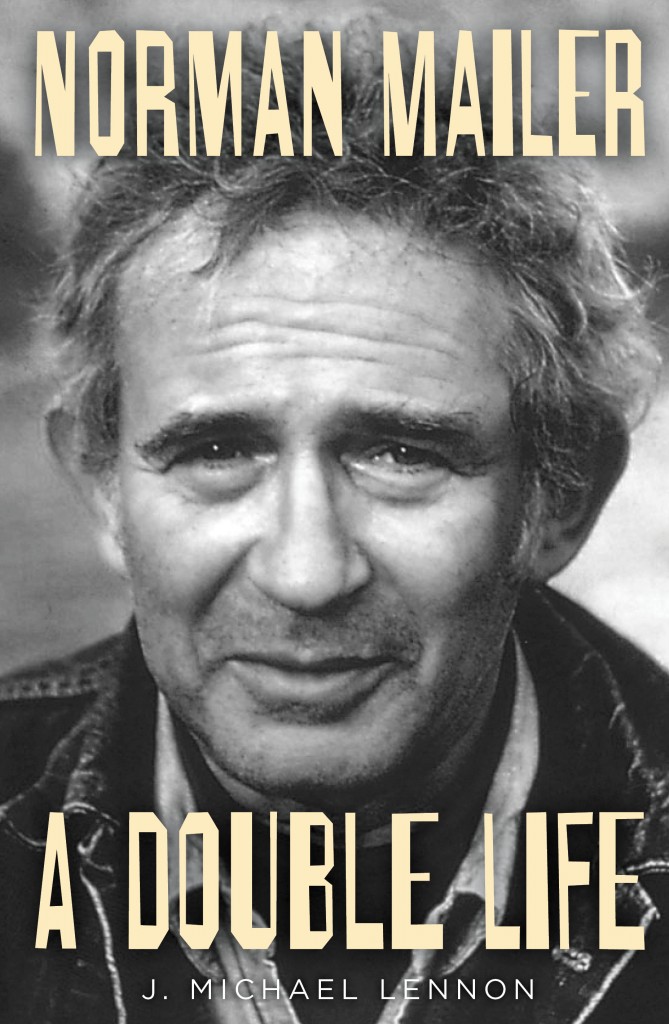Norman Mailer was the most famous writer of his generation. People who never read a word that he wrote knew who he was, whether because of his fame as a novelist or journalist, or his notoriety because of his many marriages and affairs, his rivalries with other writers (Gore Vidal, especially), his appearances on television, his campaign for mayor of New York City, his prominence as the leading public intellectual of his time.
J. Michael Lennon was authorized by Mailer and the Mailer estate to write his biography, and as such, had access to family and friends, and to unpublished documents, notably Mailer’s letters (Lennon has edited the letters for publication by Random House, Mailer’s longtime publisher). He has interviewed more than 80 people for this biography, but most important of all, he knew Mailer for decades before the latter’s death in 2007.
Norman Mailer: A Double Life reflects Mailer’s dual identities: journalist and activist, devoted family man and notorious philanderer, intellectual and fighter, writer and public figure. Mailer himself said he had two sides “and the observer is paramount.” Readers of Lennon’s biography may find this self-assessment to be debatable.
Purchase




Reception
Lennon is wisely neither apologetic not evasive. He quotes magnificent passages from the books, which should earn Mailer new readers, and he stresses Mailer’s generosity, his love and care for all his children and most of his ex-wives, his astonishing productivity and his boundless vitality that seems to bounce up at you off the pages. You end up feeling that to have read this huge book is as good as to have met him in the flesh. Perhaps better.
Andrew O’Hagan, Sunday Times
[A Double Life] is a mighty undertaking befitting Mailer’s lifetime of protean output, which began in his 20s and continued right through the last decades of his life and up to the year of his death. Lennon is a fluid writer, and he’s done his homework. There’s not a paragraph in this enormous book that doesn’t contain a nugget of something you should have known or wish you had known. Lennon has it all, and he has it down. And despite being his subject’s literary executor, he has not sanded the corners of a career and life, each of which has plenty of texture and lots of sharp edges.
New York Times
A larger-than-life personality, Norman Mailer was a force to be reckoned with in his personal life—he knew many, many people—and as a voice in the American literary canon between WWII and the beginning of the twenty-first century. Any writer of a serious biography of Mailer who hopes to contain the excesses of the man within the covers of a book must know that since Mailer in his own lifetime grated on people’s taste and nerves, he could easily grate on the reader, even when presented within the pages of a biography. Lennon, authorized by Mailer before his death to write the definitive life treatment, performs a great task, letting Mailer’s obnoxiousness have free rein in balance with the biographer’s easygoing narrative style, which coaxes the reader into accepting and even enjoying all sides of Mailer—gregarious, notoriously thin-skinned, grandly egotistical, and monstrously talented. Understanding Mailer is only half the object of this welcome biography; its other intention is for readers to be enticed into reading or rereading Mailer’s works.
Brad Hooper, Booklist
[Mike Lennon] is nicely primed to write this authorized biography, which draws on numerous interviews and unpublished letters. Given the richness of Mailer’s life as author and activist, public intellectual and philanderer, who consciously worked to shape his own identity, it’s hardly surprising that this work is nearly 1,000 pages long.
Barbara’s Picks
Appropriately sprawling biography of the larger-than-life writer, brawler, provocateur and bon vivant.
Norman Mailer (1923–2007), writes archivist and authorized biographer Lennon, grew up in a reasonably happy family, with a strong mother and dapper father, who, as Mailer wrote, “had the gift of speaking to each woman as if she was the most important woman he’d ever spoken to.” Mailer himself was fairly obsessed with women, though his quest was often thwarted—as he recalled, particularly at Harvard, where he served something of an apprenticeship. Mailer came into adulthood with a noticeable chip on his shoulder and some well-aired grievances, and he kept the pattern up throughout a long and productive life. As Advertisements for Myself (1959) proclaimed, for instance, he maintained running feuds and rivalries with all manner of writers—and, as Lennon reveals, even took Ernest Hemingway by the horns, occasioning an apology from Papa some years later. He also battled editors and critics from the start, though Hemingway helpfully instructed on the matter of reviews, “Try for Christ sake not to worry about it so much. All that is poison.” Lennon ably reveals the always-contentious Mailer but also a man who could be generous and very smart. Lennon is also a shrewd literary critic, commenting on the origins and fortunes of Mailer’s works, notably his study of Marilyn Monroe, which laid bare “his narcissism, born of early spectacular success.” Mailer possessed an outsized ego well before then, of course, but the point remains: Though he seems to be little read now, Mailer was of central importance in postwar American writing, as he would have been glad to tell you.
Detailed and anecdotal without being gossipy (a yarn concerning a nicotine-addicted cat notwithstanding) and a must-read for students and admirers of Mailer’s work.
Kirkus Reviews
In this meticulous authorized biography, Lennon offers a comprehensive and unflinching look at the life of the controversial American novelist, journalist, and filmmaker who dissected the zeitgeist from the 1950s until his death in 2007. Lennon, a personal friend and the literary executor of Mailer’s estate, had access to a trove of unpublished letters and interviews. The result, written in a measured and sometimes dry style, stresses the extremes of ugliness and compassion that defined the author’s life and work. Made famous by the publication of The Naked and the Dead, Mailer had a manic energy for writing and a roving intellect, thrusting himself into the center of current events and exploring topics such as Vietnam War protests and the history of the C.I.A. The prolific Mailer was also a public celebrity who made frequent television appearances and even ran an unsuccessful campaign for mayor of New York City. Though Lennon doesn’t hide Mailer’s dark side—his belligerent narcissism, infidelities, public drunkenness, and violence—he tries to balance these flaws by emphasizing Mailer’s passion for challenging received ideas, his sense of humor, and his moral seriousness as an opponent of power. While it’s difficult not to find Mailer the man repugnant, Lennon’s almost clinical perspective shows the author’s restless innovation, which was indispensable for understanding the U.S. in the second half of the 20th century.
Publisher’s Weekly

